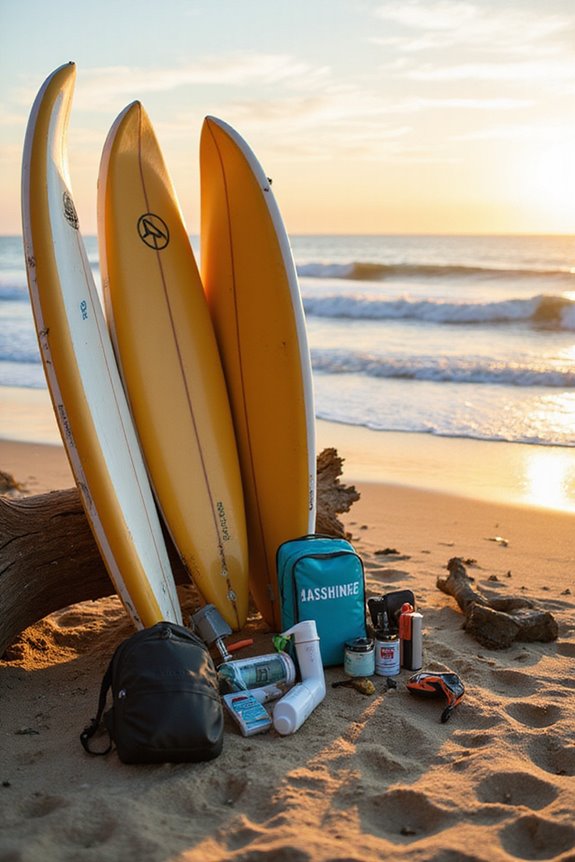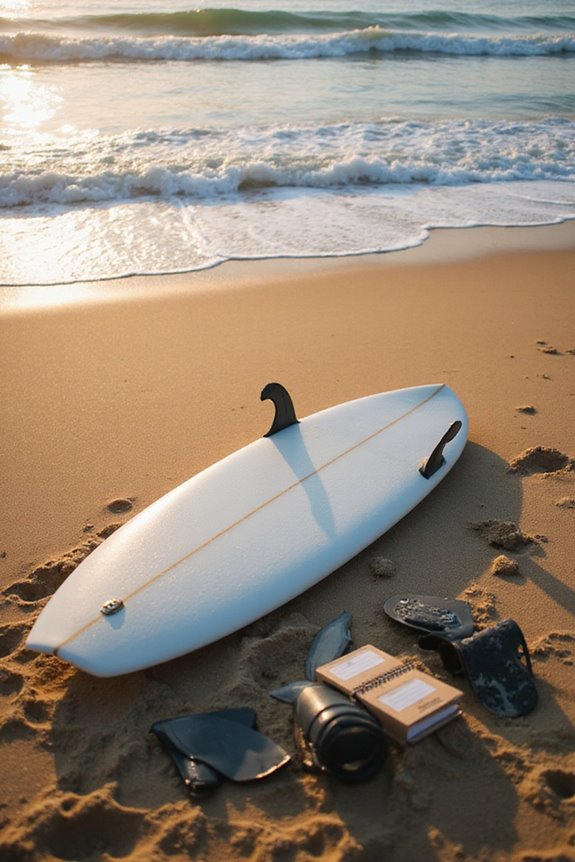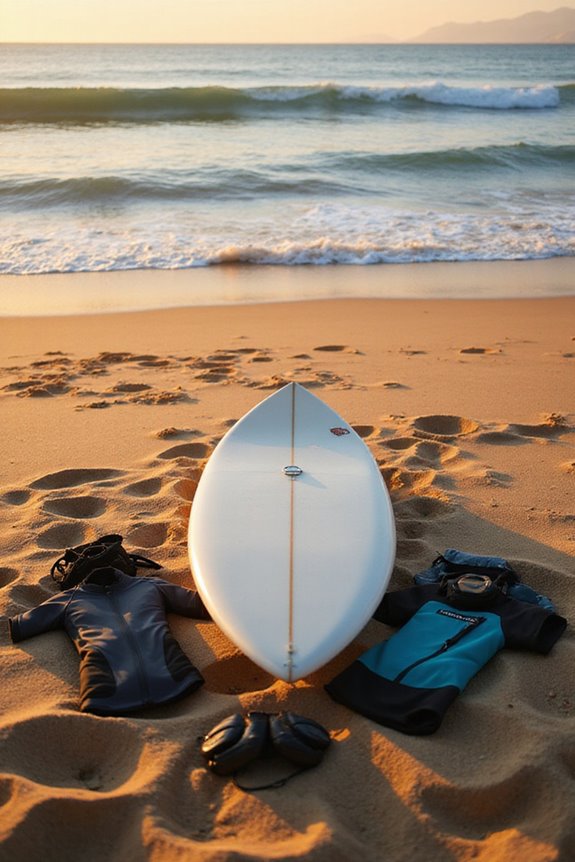To surf with asthma, we need to take specific precautions. First, we should carry our quick-relief inhalers and use them 15-20 minutes before hitting the water. Warm up gradually and practice controlled breathing to minimize symptoms. It’s important to assess our surroundings for allergens and avoid triggers. Always inform our surf buddies about our condition and what to do during an asthma attack. With these strategies, we can manage our asthma effectively while enjoying surfing. More tips are available to enhance our experience.
Key Takeaways
- Always carry your quick-relief inhaler and medications when surfing, and inform your surf buddies about your asthma condition.
- Warm up for 15 minutes before surfing to gradually increase intensity and prepare your lungs.
- Use controlled breathing techniques to warm and humidify the air before inhaling during your sessions.
- Avoid known triggers like cold air and allergens; assess your health before entering the water.
- If symptoms worsen, exit the water immediately and use your rescue inhaler; seek medical help if needed.
Understanding Asthma and Its Impact on Surfing
When we think about surfing, the thrill of catching waves is often at the forefront of our minds. However, we need to take into account how asthma symptoms can impact our surf experience. Cold air exposure during surfing can trigger bronchospasm, while inhaling seawater aerosols may irritate our airways.
Surfers can also face allergens present in both air and water, contributing to symptoms. Additionally, the physical exertion of paddling and riding waves often leads to exercise-induced bronchospasm. Curiously, some surfers report asthma symptoms appearing hours after surfing, complicating our understanding of asthma’s effects in surf conditions. Recognizing these factors is essential for managing asthma effectively while enjoying the ocean. Using safety features in surfing accessories can help mitigate some risks while enjoying the sport.
Pre-Surf Asthma Management Strategies
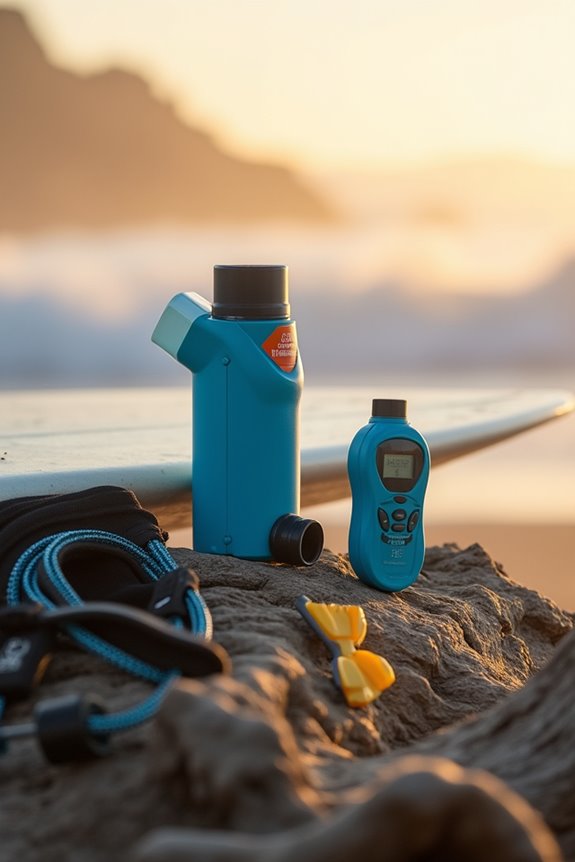
Preparing for a surf session with asthma requires thoughtful management strategies to secure a safe and enjoyable experience. First, we should confirm proper inhaler use. Short-acting beta-agonists (SABAs), like albuterol, are essential preexercise inhalers. We must avoid excessive use, as it may indicate a need for better long-term control.
Next, implementing warm-up techniques is vital. A 15-minute warm-up with gradually increasing intensity can help reduce exercise-induced bronchospasm. We should practice controlled breathing through our noses to warm and humidify the air, minimizing airway irritation. Additionally, we need to assess our health status and avoid known triggers before hitting the waves. By preparing adequately, we can enjoy our surfing experience while managing asthma effectively. It may also be beneficial to choose a surfing lesson that offers personalized instruction, as this can help tailor the experience to your individual needs.
Traveling With Asthma: Essential Precautions
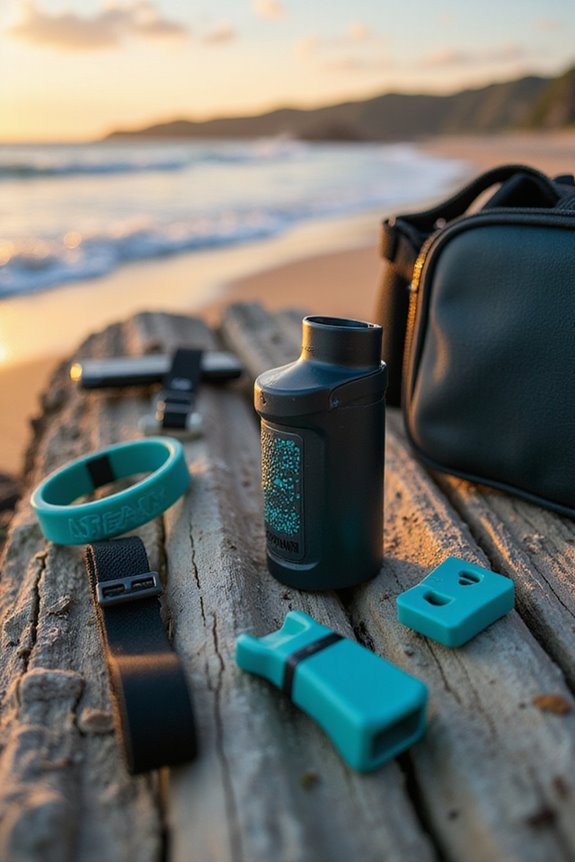
Traveling with asthma requires careful planning to guarantee that we can manage our condition while enjoying our journey. First, we should always carry emergency asthma medications and inhalers in our carry-on luggage. It’s vital to inform airline staff of our condition and request pre-boarding for a smoother experience.
To manage environmental triggers, we must avoid tobacco smoke and strong odors. Staying hydrated is important, especially in hot weather. We should also research nearby medical facilities at our destination and carry enough medication for the trip, plus extras for delays. Additionally, ensuring we have access to appropriate sun protection(5 Best Kids Rash Guards for Ultimate Sun Protection and Comfort) can help prevent potential triggers during outdoor activities.
Lastly, considering travel insurance can provide peace of mind in case of emergencies. Proper medication storage and accessibility during travel will make certain we’re prepared for any situation.
Handling Exercise-Induced Asthma While Surfing
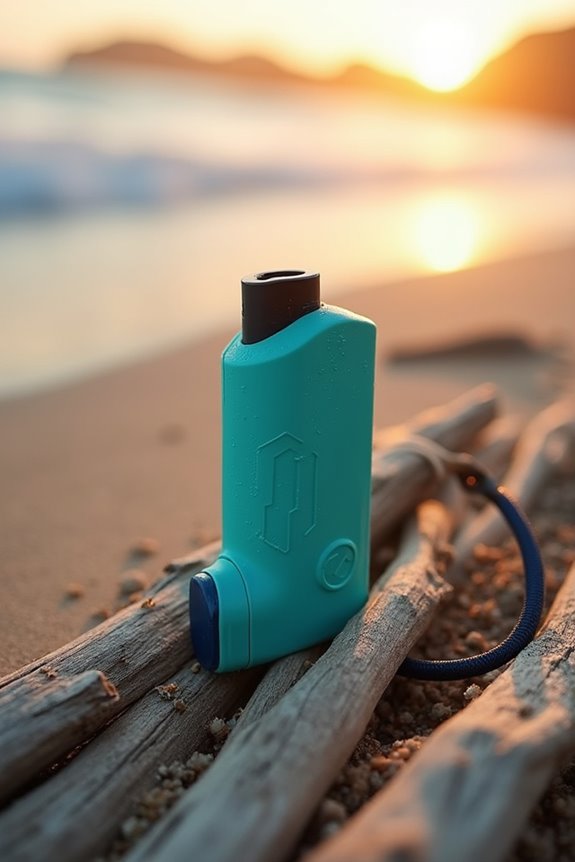
Handling exercise-induced asthma while surfing requires careful management to guarantee a safe and enjoyable experience. We should use our prescribed quick-relief inhalers about 15–20 minutes before hitting the waves for effective medication timing. Incorporating proper breathing techniques, like controlled inhalation, can help us minimize symptoms during surfing.
It’s vital to warm up adequately before surfing and monitor our respiratory status throughout the session. If we notice increased reliance on rescue medication or experience recent asthma flare-ups, it’s important to avoid surfing until our condition stabilizes. By developing a personalized asthma management plan with our healthcare provider, we can address specific triggers and ensure a safer surfing experience. Additionally, wearing a high-visibility surf safety vest can enhance our safety while in the water, especially in crowded conditions.
Environmental and Physical Factors to Consider
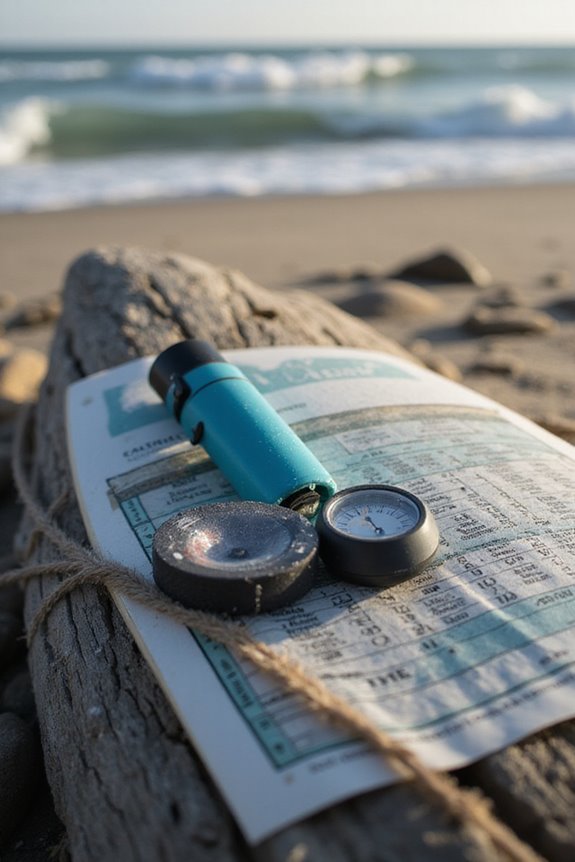
When we consider surfing with asthma, being aware of environmental and physical factors is essential for our safety and enjoyment.
Weather Conditions
Cold air can trigger bronchospasm, while high humidity and sudden temperature changes may irritate our airways. We should monitor weather forecasts to avoid adverse conditions.
Allergen Exposure
Coastal environments expose us to various allergens like pollen, mold spores, and sea spray that can provoke asthma symptoms. It’s wise to time our surf sessions to minimize allergen exposure, especially during high pollen seasons.
Pollution Awareness
We must also consider air quality. Avoiding areas with high pollution or poor air quality, especially near industrial sites, can help reduce asthma flare-ups while we surf. Additionally, being mindful of weather conditions can further enhance our surfing experience and help manage asthma effectively.
Safety and Emergency Preparedness for Surfers With Asthma
Safety and emergency preparedness are essential for surfers with asthma, as understanding how to manage potential risks can greatly enhance our surfing experience. We should always carry our prescribed asthma medications, including quick-relief inhalers, during surf sessions. Informing our surf buddies about our condition and medication locations guarantees an effective emergency response.
Recognizing early signs of an asthma attack, such as wheezing or chest tightness, is imperative. If an attack occurs, we must use our rescue inhaler immediately and exit the water if symptoms persist. Regular asthma education and rehearsing emergency plans with our surf group can markedly improve our preparedness. Remember to pack extra inhalers and medical supplies when heading to remote surfing locations. Additionally, having medical emergency assistance coverage in your travel insurance can provide peace of mind while surfing in unfamiliar areas.
Frequently Asked Questions
Can I Surf if My Asthma Is Well-Controlled?
Yes, we can surf if our asthma is well-controlled. We just need to be mindful of asthma triggers and surf conditions. Let’s guarantee we have our medications handy and stay aware of our surroundings.
What Should I Do if I Forget My Inhaler?
When the wind carries our sail away, we must find alternative inhalers, take emergency actions, and remain calm. Breathing deeply helps guide us until we reclaim our breath, steering through the storm with care and awareness.
Are There Specific Surf Spots Safer for Asthmatics?
When choosing surf spots, we should prioritize areas with gentle wave types and favorable surf conditions. This way, we can enjoy our time in the water while minimizing the risk of asthma exacerbations.
How Does Humidity Affect Asthma While Surfing?
Did you know humidity can double airway resistance for asthmatics? We must be cautious, as high humidity levels amplify asthma triggers like mold and pollen, making it harder to breathe while surfing. Let’s stay informed!
Can I Take Asthma Medication Before Surfing?
Yes, we can take asthma medication before surfing. It’s important to contemplate medication timing to effectively manage symptoms while being aware of potential asthma triggers in the environment to enjoy our surfing experience safely.

